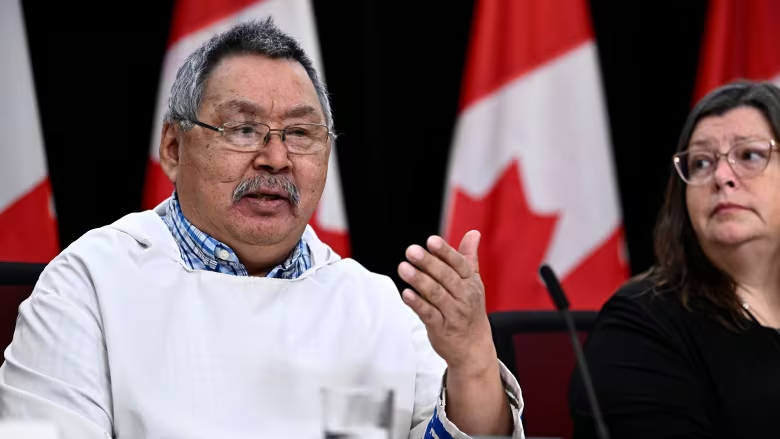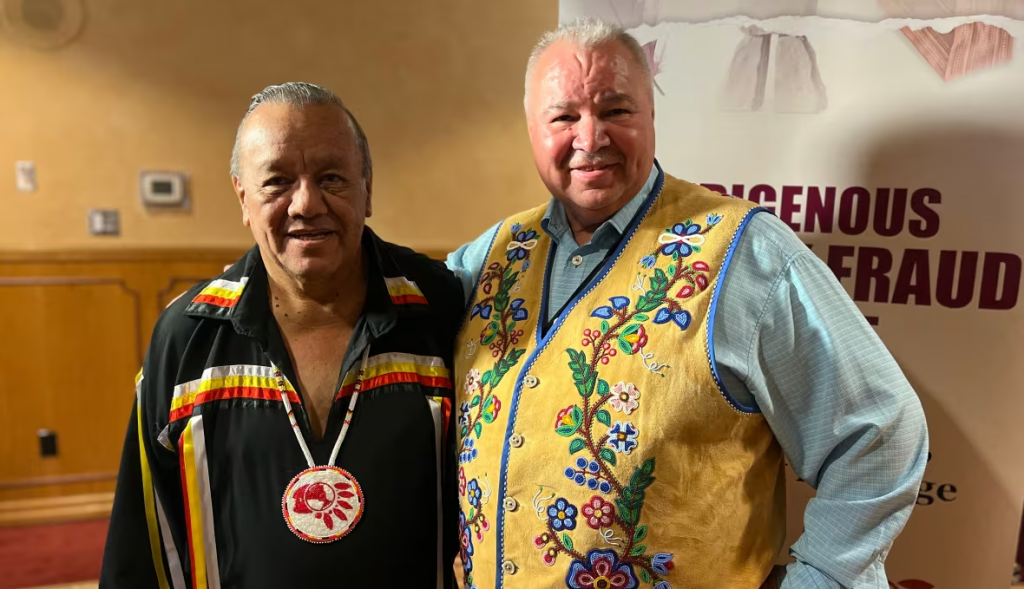Canada News
Indigenous leaders adopt declaration condemning identity theft

Johannes Lampe, president of Nunatsiavut, speaks during a news conference in Ottawa in November 2023. (Justin Tang/The Canadian Press)
· CBC News
Delegates also adopt resolution denouncing disputed Inuit identity claims of NunatuKavut in Labrador
First Nations, Inuit and Red River Métis leaders unanimously adopted what they’re calling a historic declaration condemning Indigenous identity theft Wednesday afternoon in Winnipeg.
Delegates from Ontario First Nations, northern Labrador Inuit and Manitoba Métis carried the resolution by consensus, capping the two-day Indigenous Identity Fraud Summit at the Fort Garry Hotel.
The declaration demands, among other things, that federal and provincial governments “cease their actions accommodating these identity thieves” and co-operate with legitimate nations to correct the “egregious affront” to their peoples.
“We condemn in the strongest terms those who engage in Indigenous identity fraud, whether for financial gain, academic recognition or any other purpose,” the declaration says.
“Such actions are unacceptable and contribute to the ongoing marginalization of authentic First Nation, Inuit and Red River Métis voices and experiences.”
Co-hosts Chiefs of Ontario (COO), representing 133 First Nations in Ontario, and the Manitoba Métis Federation (MMF) hailed the declaration and said it paves the way for greater organizing, political pressure and action.
Glen Hare, Ontario regional chief elected by COO, was moved to tears after it was adopted, as he spoke of the centuries of hardship suffered by First Nations people, particularly children.


He stood with MMF President David Chartrand and Johannes Lampe, president of Nunatsiavut Government, the self-governing authority in northern Labrador, in a show of unity.
Hare said at a news conference later, “This summit has demonstrated our nations are committed to wholeheartedly addressing this matter with the urgency it deserves.”
Ogimaa Shelly Moore-Frappier of Temagami First Nation said, “We really have to think about what the impacts have been on us.
“We have had to fight hard to be in these institutions… then we have people who come in and learn a hand drum song and go running with it.”
Resolution on NunatuKavut
The summit earlier on Wednesday adopted a resolution denouncing the disputed Inuit identity claims of NunatuKavut Community Council (NCC).
The council, formerly the Labrador Métis Association and the Labrador Métis Nation, represents 6,000 self-identifying Inuit in south and central Labrador.
Lampe told the delegates that Inuit stand united in the conviction the group is non-Indigenous.
“Accepting false claims undermines what we’ve fought so hard to achieve,” he said.
“Recognizing a settler group in Labrador as Indigenous is harmful and disrespectful and wrong. This is not reconciliation.”
In 2019, the federal government signed a memorandum of understanding recognizing NunatuKavut as an “Indigenous collective” capable of holding Indigenous rights.
Innu Nation, representing the Labrador First Nations communities of Sheshatshiu and Natuashish, has filed a court challenge against the agreement.
“Many of the stories they tell are stolen,” Innu Nation Grand Chief Simon Pokue said of NCC in a speech to the delegates.
He accused NCC of being a race-shifting organization that operates from a position of privilege. By recognizing and funding it, Canada is perpetuating “economic violence” and recolonization against Innu, he said.
“If the government of Canada can water down the rights of true Indigenous people, then we will cease to exist as distinct,” he said.
“Perhaps the government’s goal is to make everyone Indigenous, so that no one is…. They will not make us white. They could make white people Indigenous.”
That sentiment was a recurring one through the presentations. Chartrand pledged Lampe and Pokue his full support on behalf of the Red River Métis.
“These people are shifting their positions as fast as you can change your socks,” Chartrand said.
“Today if they lose the Inuit argument, what are they next? A First Nation?”
NunatuKavut responds
Todd Russell, NunatuKavut president, said in a phone interview that what is shifting is not NCC’s positions but the political posture of those in the room.
“This meeting is nothing but a bunch of disgruntled groups who’re trying to suppress the rights and interests of other Indigenous people, in our case the Inuit of NunatuKavut,” he said.


Russell called the resolution ludicrous and said he couldn’t care less about it but he did acknowledge he is concerned about the pressure from MMF, COO, Nunatsiavut Government and Innu Nation influencing federal decisions.
“It’s concerning, yes,” he said.
“But do I give any credence to the meeting? No. Do I give any credence to the resolutions? Absolutely not.”
He said nothing will deter NCC from representing its people and fighting for their rights.
Day 1 of the summit largely focused on the Métis Nation of Ontario (MNO), whose claims of a historic Métis presence throughout the province COO and MMF reject. The summit passed a resolution Tuesday denouncing MNO.
In a statement, MNO accused MMF of using the summit to “distort the truth about Métis Nation history and identity, and to further the MMF’s political agenda,” by rebranding the entire Métis Nation as the Red River Métis.
“This continued pattern of revisionist history, without providing any opportunity for face-to-face conversation with Métis Nation governments, is entirely unproductive, dangerous, and must not be allowed to continue,” the statement read.
The Indigenous Peoples Alliance of Manitoba, affiliated with the Congress of Aboriginal Peoples — which is also affiliated with NunatuKavut — echoed the other groups’ reactions.
MMF “have been regularly changing the definition of who qualifies to be a Métis person since their withdrawal from the Métis National Council in September 2021,” the alliance said in a Wednesday news release.
This article is republished from RCI.





















